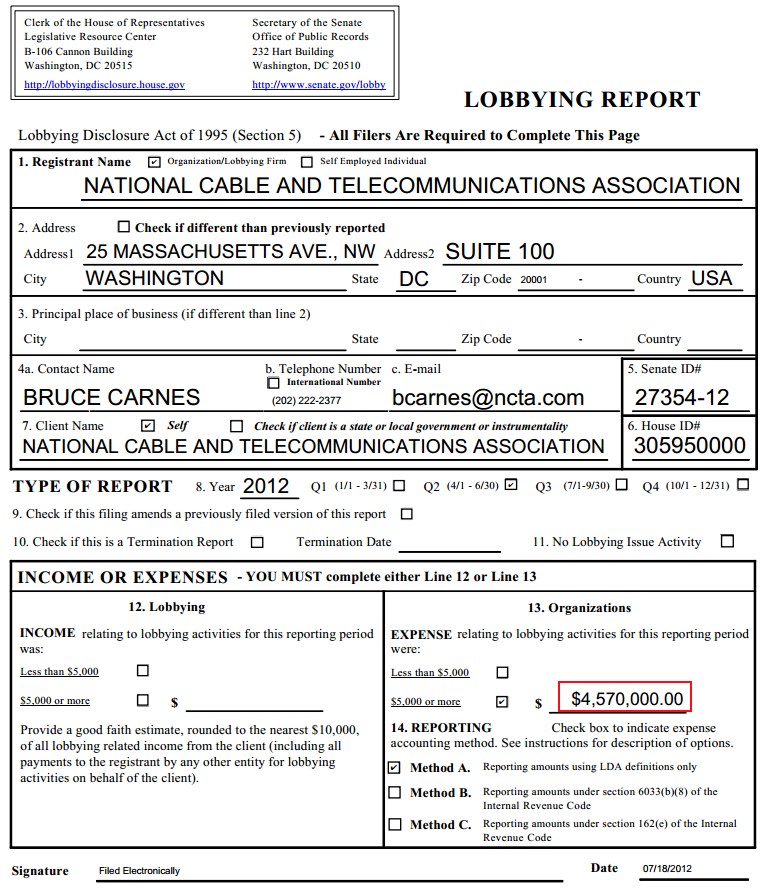 Time Warner Cable customers in Kansas City are ground zero for the cable operator’s retransmission consent battles with over-the-air stations that leave cable viewers without a full lineup of local channels.
Time Warner Cable customers in Kansas City are ground zero for the cable operator’s retransmission consent battles with over-the-air stations that leave cable viewers without a full lineup of local channels.
Just hours after Time Warner customers got back two local stations owned by Hearst Corporation, Meredith Corporation’s KCTV and KSMO are preparing to pull the plug at midnight tonight.
“Please know that we have tried very hard to reach an agreement with Time Warner Cable, so that our viewers would not have to miss any of our stations’ around-the-clock reporting of news, politics, traffic, weather emergencies, public service announcements, and favorite local and national programming,” reads a statement from the two stations. “We are disappointed in the outcome of our negotiations especially since we have successfully reached agreements with every major cable and satellite company that recognizes our fair market value. The fact is that we are only asking Time Warner Cable for pennies a day from your cable bill for our programming.”
 They did not elaborate on exactly how many pennies more a day they were asking to receive. Time Warner Cable suggested they wanted a 200% rate hike.
They did not elaborate on exactly how many pennies more a day they were asking to receive. Time Warner Cable suggested they wanted a 200% rate hike.
Should negotiations fail, viewers in Kansas City will lose their local CBS and CW affiliates. Time Warner Cable’s recent response to these disputes is to replace missing local stations with out-of-area stations, in this case most likely Nexstar’s WROC-TV in Rochester, N.Y., a CBS affiliate. Time Warner has not bothered to find a fill-in CW station to date.
But Nexstar last week sued Time Warner Cable in U.S. District Court in the northern district of Texas alleging copyright infringement and breach of contract for importing its TV stations without permission. Nexstar wants a temporary restraining order and damages. If the judge hearing the case issues the restraining order, Kansas City will have to do without a CBS station on Time Warner’s lineup until the dispute is settled.
So far this year, there have 69 instances of local stations withholding their signals from either a cable, phone, or satellite operator in disputes over retransmission rights fees.
In a hearing held yesterday in Washington, several senators attacked the disputes that deprive paying subscribers of broadcast stations.
 Sen. Jim DeMint (R-S.C.) wants to repeal the 1992 law that allows broadcasters to require pay television operators to get permission and, in an increasing number of cases, payment to carry local broadcast stations.
Sen. Jim DeMint (R-S.C.) wants to repeal the 1992 law that allows broadcasters to require pay television operators to get permission and, in an increasing number of cases, payment to carry local broadcast stations.
DeMint argues the law has outlived its usefulness.
But Sen. John Kerry (D-Mass.) and others note the law also enacted several consumer protections and pro-competition policies that stopped programmers from withholding programming from competing pay television providers.
Kerry called demands to repeal the law altogether “radical” and suggested such moves could destroy local broadcasting. Cable operators want the power to negotiate contracts with out-of-area stations to leverage lower retransmission consent fees from broadcasters and provide customers with replacement stations when the two sides can’t or won’t agree to terms.
Broadcasters have suggested that could leave cable viewers with stations from distant cities, depriving viewers of important local news and emergency information.
For now, no action in Washington is anticipated. Broadcasters have leveraged their popularity to demand increasing payments for permission to carry their signals, and cable and other pay television operators, despite protests, usually agree to slightly lower fee increases and pass them right along to paying subscribers in the form of a rate increase.
Yesterday’s hearing, chaired by Sen. Jay Rockefeller (D-WV), discussed changes in television technologies over the past two decades. It focused on examining the effectiveness of the Must-Carry law, a 1992 law currently in place for the cable industry. The Must-Carry law requires a variety of local broadcast stations to be viewed on pay-TV platforms. Today’s Must-Carry rights were enacted by Congress in the 1992 Cable Act, which the Supreme court upheld in 1997. Congress then found that cable systems have an “economic incentive” to alter their local broadcast signals and that, without Must-Carry rules, broadcasters’ viability is jeopardized.
Although Chairman Rockefeller sought to not have the hearing derailed by retransmission consent disputes, a significant portion of the hearing dealt with that specific issue.
Top cable and broadcasting executives, as well as law experts testify. Witnesses include Melinda Witmer from Time Warner Cable; Martin Franks of CBS; the National Association of Broadcasters’ Gordon Smith; Colleen Abdoulah from Wide Open West!; Gordon Smith from the American Cable Association; law professor and former Disney Washington executive Preston Padden; along with Mark Cooper from the Consumer Federation of America. Courtesy: C-SPAN (1 Hour, 41 Minutes)


 Subscribe
Subscribe







